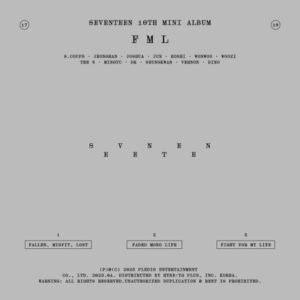
If there’s one word to put to Seventeen’s name, it’s unstoppable. Nearly eight years into their career, the group has seen their organic, steady growth come to full fruition with their latest release and tenth mini album, FML.
As both an album and turning point in Seventeen’s story, FML feels like a leap to greater heights in more ways than one. For years, the self-produced group has often helmed the moniker of “underdog” in the expansive, ever-competitive world of K-pop. Now, their latest album is bigger in scale — and more popular — than ever. The EP has already broken records left and right, including earning the record for most pre-orders for a K-pop album globally with over 4.64 million pre-orders. With FML, Seventeen are also the first to surpass the three-million sales mark on Day 1 of release in Hanteo’s chart history, and the numbers are only continuing to grow from there.
Although FML sticks to the group’s tried-and-true mini album formula of three unit tracks (one each for the Hip Hop, Vocal, and Performance teams) and three full-group tracks, it makes a concerted effort to help the group and their music scale up to their full potential and flip any expectations on their heads. For starters, it contains the group’s first explicit title, “F*ck My Life,” along with their first-ever bid to release dual title tracks, which also includes grand lead single “Super.” On top of that, FML contains a heavily experimental throughline and stadium-level sound to up the ante in Seventeen’s continued quest to broaden the limits of their musical identity.
In some ways, they succeed in this quest; in others, they fall short. Still, Seventeen’s dedication to uncovering the new and reinventing themselves and their sound one album at a time so far into their career is a rare feat in and of itself. Successes and shortcomings aside, FML and its contents serve as a stark reminder of how far Seventeen have come and how much opportunity they still have to grow and prosper; this, despite the album title’s seemingly negative connotation, which typically stands for the phrase “F*ck my life.”
Rather than adhere to “FML”’s most common meaning, Seventeen look to reconfigure the term’s definition in the album’s first song and title track of the same name. Here, they flip the acronym’s conventional meaning on its head to ultimately have a more positive connotation, instead singing of their commitment to “fight for my my life” even amidst the lulls and lows of everyday struggles (“I’m the only one who became a fool in this f*cking world”).
The track lacks the in-your-face intensity of second title “Super,” instead utilizing its melancholic 2000s alternative rock-meets-R&B sound to portray both the worries the group frets over in their lyrics and the grit in the members’ vocals to capture the track’s hopeful undertones. It may not be the most memorable of Seventeen titles, but it surely sets the tone for the confident identity they strive to display throughout the rest of FML.
While “F*ck my life” veers outside of expectations by chipping away at Seventeen’s upbeat exterior, second title track “Super” is the most obvious foray into a completely different and new side of Seventeen. There is a slight callback to the intensity of 2019’s “Hit” and half-grating production aspects of 2022’s “Hot,” but “Super” brings the group’s confidence and sound up to their grandest and most unconventional scale yet. Produced by Woozi, the track is lofty and ambitious, combining Jersey club beats, traditional instruments, and a hefty anti-drop — several elements the group has rarely implemented in their music before.
In many places, from the opening vocal blend seemingly built to echo through a stadium to the catchy hook of “Darimdarimda” sung by Mingyu and Joshua to even the continuously spiraling beat, “Super” works well. Seventeen also utilize a different tactic in divvying up the members’ lines than in their previous tracks, giving each member an entire section of the song at once rather than a series of back-and-forth one liners. This adds further intrigue and contrast throughout various points in the track, only emphasizing its hooks and ability to combine so many pieces, big and small, into one monumental track.
In other aspects, namely the weight of the chorus’s anti-drop which at first threatens to bring the track’s momentum to a screeching halt, “Super” doesn’t quite live up to its name. There’s also the shock factor of how different it sounds in comparison to the group’s more recent title tracks upon first listen, but Seventeen fight to make this sound their own, bringing together even the most disjointed elements to create an anthemic celebration of their togetherness and strength as a team.

Seventeen continue their ultra-experimental streak on Hip Hop unit track “Fire” and performance unit track “I Don’t Understand But I Luv U.” The payoff differs between the two, however, with “Fire” proving to be one of the more challenging listens on the album and “I Don’t Understand But I Luv U” coming out on top. Helmed by an in-your-face Afrobeats-inspired beat and instrumentation and Wonwoo’s repetition of the word “fire,” “Fire” is risky and different, and not always easy on the ears. Stark structural changes and harsh production effects aside, the track has some of the unit’s best rap deliveries and lyrical moments to date. Vernon’s verse in particular is another reminder of Seventeen’s confidence that shines through throughout the album:
We’ve been touring domes now
Haven’t you heard it now?
Stadium tours too, hey
Release it now
Denial of injustice, victory, yes, I can now, hеy
Boy band making bands
Twelve years, SEVENTEEN got my back, hеy
“I Don’t Understand But I Luv U” is also further outside of the realm of music Seventeen have previously released, even for the Performance unit, who are known for their sultrier sound. Here, the experimentation especially comes through in the form of the track’s heaviness, aided by a slow, practically lagging R&B beat to match a gooey, trudging electric guitar riff.
Like the heaviness in “Super”’s anti-drop and “Fire”’s at times over-stimulating layers of instrumentation and structural shifts, “I Don’t Understand But I Luv U” also risks being weighed down by the heaviness of its own production. However, the repetition of the lyrics “I don’t understand but I love you,” which came from a comment by an international fan during one of the group’s lives, gives the track a much needed sense of catchiness to keep it going.
On the other hand, the remaining two songs, “Dust” and “April shower,” stray away from Seventeen’s efforts to showcase a new musical identity and instead opt for familiarity and dependability. Both are solid in sound, vocals, and production, but merely falter due to their inability to stand out amongst the aforementioned songs. “Dust” is a light, city pop-esque release from the Vocal team that describes the aftermath of a breakup, and “April shower” is the obligatory and cheery full-group closer. It’s also upbeat, poppy, and catchy, and perhaps the album’s easiest listen. But, despite these tracks’ dependable nature, they don’t have much going for them to help them stand out amongst the rest of the album, or Seventeen’s discography in general.

Seventeen clearly have plenty to explore, but they’re not going down without a fight. For a majority of FML, Seventeen seek to reinvent themselves and bend the limits of their musical identity, both when they’re together (“Super”), and within their respective units (“Fire,” “I Don’t Understand But I Luv U”). The album may not be the most cohesive sonically and identity-wise, even with its prominent motifs of hope, confidence, and perseverance in the face of adversity, but it does get just the right amount right.
It’s safe to say that the group succeeds in pooling together their talents and drive to convince listeners that these new sounds and musical identities indeed work for them, but they still fall short in the execution, namely production-wise, on some of the songs, and then in their reliance on older formulas to pull it all together in the end. It’s a solid record, and one that adds grandeur and intrigue to their ever-expanding universe of sound, but not one that has the sense or feeling of longevity compared to previous releases. It’s a new Seventeen, and one they’ll have to continue to build upon to see the fruits of their labor all the way through.
(YouTube [1][2]. Consequence of Sound. Forbes. Lyrics via Genius. Images via Pledis Entertainment.)


